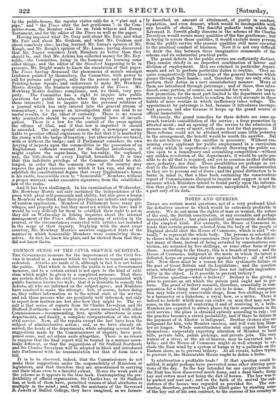COMMON SENSE OF THE CIVIL SERVICE QUESTION. TICE Government measure
for the improvement of the Civil Ser- vice is treated in a manner which we venture to regard as unpre- cedented. Attacks are made at it, although in fact it is not before the public. That which is before the public is not a Government measure, and to a certain extent is not open to the kind of criti- cism which might be given to a completed measure. That there are certain defects in the civil service, everybody acquainted with public business knows too well; that it is desirable to remedy the defects, all who are informed on the subject agree ; and Ministers have resolved to make the attempt : but, of course, before doing so, they collect information as to the actual state of the service, and ask those persons who are peculiarly well informed, not only to report how matters are but also how they might be. The re- sult is that series of reports from Sir Charles Trevelyan and Sir Stafford Northcote—who were in most cases associated with other Commissioners—recommending, first, specific alterations in some departments, and finally, a complete reorganization of the whole civil service. Now, all the reports except the last have been the subject of administrative action ; and, as we have already ob- served, the heads of the departments, while adopting several of the suggestions made by the Commissioners of inquiry, have post- poned some, and set others aside altogether. There is no reason to suppose that the final report will be treated in a manner essen- tially different, or that the suggestions of Sir Stafford Northcote and Sir Charles Trevelyan will be adopted in block and introduced into Parliament with no transmutation but that of form into a bill.
It is to be observed, indeed, that the Commissioners do not make their suggestions under the responsibility of Ministers or legislators, and that therefore they are unrestrained in carrying out their ideas even to a fanciful extent. Hence the weak part of the scheme as it appears in the blue book. Contemplating the per- fectibility of official organization, Sir Charles has, or Sir Stafford has, or both of them have, permitted visions of ideal attributes to multiply in the mind ; and, with the assistance of the Reverend IL Jewett of Balliol College, they have imagined, as we former- ly described, an amount of attainment, of purity in conduct reputation, and even descent, which would be incompatible with any breadth of choice. The fanciful pedantic testa which the Reverend B. Sowett gladly discerns in the scheme of Sir Charles Trevelyan would secure many qualities of the fine gentleman; but in trying to secure those qualities, it would exclude many persons from the public service who possess qualities still more essential to the practical conduct of business. Now it is not very difficult to draw the line between these imaginative ornaments of the scheme and its substantial practical parts.
The grand defects in the public service are sufficiently distinct. They consist chiefly in an imperfect combination of labour and division of employment. Men are retained in particular depart- ments and set to perform particular duties in routine. They ac- quire comparatively little knowlege of the general business which passes through their hands ; and, therefore, they are only able to perform their duties in a very unsatisfactory manner. Many of them are introduced through patronage ; and of those, thus intro- duced, some portion, of course, are unsuited for work. An imper- fect promotion, for the most part limited to the department and to succession by seniority, tends to confirm the civil servants in those habits of mere routine in which inefficiency takes refuge. The appointment by patronage is bad, because it introduces incompe- tent persons, and also because it keeps up the grand source of official immorality.
Obviously, the grand remedies for these defects are some ap. preach towards consolidation of the service ; a freer promotion by attested merit ; and an opening of the service to the admission of persons on the score of merit, with some test for that purpose. If those reforms could not be attained without some little pedantry in the arrangement, the benefit would be worth the sacrifice. But we do not believe that the sacrifice is necessary. -Without exa- mining every applicant for public employment in a curriculum of study which is superfluous—without throwing the public ser- vice open to a tumnituary and scrambling competition—without any sudden revolution of the departments, it would be quite pos- sible to do all that is required, and yet to occasion neither disturb- ance, pedantry, nor fuss. These possibilities are perhaps as evi- dent to the Ministers who have the framing of the reconstruction as they are to persons out of doors ; and the grand distinction to be borne in mind is, that a blue book containing the conscientious report of Commissioners charged to inquire and suggest is not the measure which Ministers intend to found partly upon the informa- tion thus given; nor can that measure, unexplained, be judged by a part only of its data.


































 Previous page
Previous page